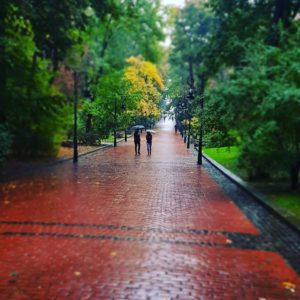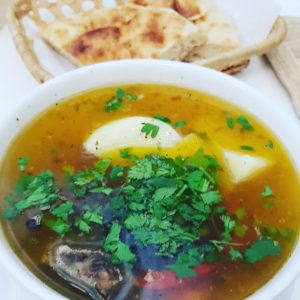Lviv’s locals joke about their city being the ‘London of Ukraine’. It is not expensive – far from it. In fact, the city surprises you at every turn with its attractive menus, generously portioned dishes and reasonable prices. But it does rain. Yet somehow this accentuates the other-worldliness of the gothic, neo-Renaissance and art nouveau buildings that line much of the charming city centre. 
When the sun does appear, you find yourself in a different mood altogether. Do come prepared with both umbrella and sunglasses.
Speaking the very little Russian I do proved useless, but just about remembering the Cyrillic alphabet assisted me greatly with locating Ukrainian addresses. I finally came across the Galician Museum of Jews, effectively a treasure trove at the back of the Hesed-Arieh Jewish Centre, which is about as higgeldy but joyously piggeldy a museum one can find.
Olga made for a generous and knowledgeable guide. She reminded me there isn’t a definitive number of Jews in the city- maybe 1,500.
Before World War Two, there were well in excess of 150,000 Jewish people living here; both close to the old city arsenal, where today all you can see is the moving memorial to the Golden Rose synagogue, and a slightly schmaltzy Yiddish restaurant next door, (which does serve a decent Chicken Soup); and to the north, where Sholem Aleichem once lived and many others who would have inspired his folk stories. 
Of those Jewish people who do remain in the city, Olga told me, many are scarred by the Soviet era. Many simply cannot own up in their own minds’ to who they are.
She referred to Lemberg, which is what the city was called under Austrian-Hungarian rule, a period of relative tolerance where the arts flourished. This charmed city has been at a cultural crossroads and is the best of both Western and Eastern-influences.
I indulged in a paprika-peppered beef broth at a restaurant dedicated to Crimean cuisine, Krym; the Tatars came here many centuries before Franz Josef I, as did Armenians, Greek Catholics and Poles. Their footprint – and fingerprints – leave a delectable trace on not just the menus, but the many cupolas and church spires of the city’s inner ring.
But on my first night, I took myself not to a church but to the stately Opera House, named after one of Puccini’s favourite singers, Solomiya Krushelnytska. I took in the Ballet, Giselle, and had a wonderful seat for just nine pounds.
The city has known its dark times but it is trying to find a new identity again. For now, it is beguiling and bewitching with its very few English-speakers, excess of Ladas, tasty ‘Varenky’ (think Pierogi); cherry liquer; love of coffee and chocolate (I truly overdosed) and tiny Armenian quarter. 
It’s just as well I didn’t sleep brilliantly my first night because it allowed me to indulge in Lviv’s famed coffeehouse culture, which local Pavol introduced me to. There was a style of coffee with rose essence. Another coffee was heated, Turkish~style, in sand, with the heat equally applied to the pot. Other coffees were a little oily but hit the spot. My sixth of the day was just the pick me-up needed before the Ballet. It turns out I missed the annual Coffee (and Cheese) festival by a week! And the coffee festival was a couple of weeks ago. But I compensated with some sacher and marmelade cake.
